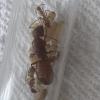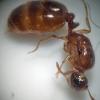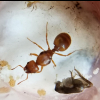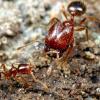- Formiculture.com
- Forums
- Gallery
- Members
- Member Map
- Chat

My tetramorium eggs are taking way too long to develop
Started By
Spazmops
, Jul 19 2020 3:22 PM
tetramorium
6 replies to this topic
#1
 Offline
-
Posted July 19 2020 - 3:22 PM
Offline
-
Posted July 19 2020 - 3:22 PM
I’ve had a tetramorium sp. e queen in a dark test tube setup for about 2 months now, and while there is plenty of larva, there’s no pupa or nanitics yet. It’s only supposed to take 42-63 days for the eggs to develop into adult workers. Do you guys have any idea what I’m doing wrong?
Co-owner and founder of Mountain Myrmeculture and The Menagerie Discord Server.
Ants I have:
1 Formica fusca group- 0 workers
1 Tetramorium immigrans colony-20 workers
1 Dorymyrmex insanus- 1 queen, used to have workers
1 large P. occidentalis colony- around 50 workers, plenty of brood
#2
 Offline
-
Posted July 19 2020 - 3:47 PM
Offline
-
Posted July 19 2020 - 3:47 PM
Maybe its infertile.
Ants I have: Tapinoma sessile(2 queen colony). RED MORPH Camponotus neacticus(now has pupae!), Tetramorium immigrans (x3), Aphaenogaster sp, Temnothorax sp, Brachymyrmex sp. possibly infertile ![]() , Ponera pennsylvanica, and Pheidole morrisi!
, Ponera pennsylvanica, and Pheidole morrisi! ![]()
Other insects: Polistes sp. Queen
Ants I need: Pheidole sp., Trachymyrmex sp., Crematogaster cerasi , Dorymyrmex sp. Most wanted: Pheidole morrisii
#3
 Offline
-
Posted July 19 2020 - 4:03 PM
Offline
-
Posted July 19 2020 - 4:03 PM
I agree with AntKid, the eggs may be infertile unfortunately.
My Ants:
(x1) Campontous semitstaceus ~20 workers, 1 Queen
(x1) Camponotus vicinus ~10 workers, 1 Queen (all black variety)
(x1) Tetramorium immigrans ~100 workers, 1 Queen
(x1) Myrmercocystus mexicanus -1 Queen
(x2) Mymercocystus mimcus -1 Queen
(x1) Mymercocystus testaceus ~45 workers, 1 Queen
(x1) Campontous semitstaceus ~20 workers, 1 Queen
(x1) Camponotus vicinus ~10 workers, 1 Queen (all black variety)
(x1) Tetramorium immigrans ~100 workers, 1 Queen
(x1) Myrmercocystus mexicanus -1 Queen
(x2) Mymercocystus mimcus -1 Queen
(x1) Mymercocystus testaceus ~45 workers, 1 Queen
#4
 Offline
-
Posted July 19 2020 - 4:20 PM
Offline
-
Posted July 19 2020 - 4:20 PM
What temperature are they kept at? 80-90 would be optimal.
"The ants are a people not strong, yet they prepare their meat in the summer." Prov. 30:25
Keep ordinary ants in extraordinary ways.
Keep ordinary ants in extraordinary ways.
#5
 Offline
-
Posted July 19 2020 - 4:28 PM
Offline
-
Posted July 19 2020 - 4:28 PM
Can eggs be infertile if there’s larva?I agree with AntKid, the eggs may be infertile unfortunately.
They’re kept at around 78°, which is the warmest place in my houseWhat temperature are they kept at? 80-90 would be optimal.
Co-owner and founder of Mountain Myrmeculture and The Menagerie Discord Server.
Ants I have:
1 Formica fusca group- 0 workers
1 Tetramorium immigrans colony-20 workers
1 Dorymyrmex insanus- 1 queen, used to have workers
1 large P. occidentalis colony- around 50 workers, plenty of brood
#6
 Offline
-
Posted July 19 2020 - 4:53 PM
Offline
-
Posted July 19 2020 - 4:53 PM
Can eggs be infertile if there’s larva?I agree with AntKid, the eggs may be infertile unfortunately.
They’re kept at around 78°, which is the warmest place in my houseWhat temperature are they kept at? 80-90 would be optimal.
Yes, infertile eggs can hatch into larvae, and pupate, then become a drone, Which often occurs in unmated queens.
- Antkid12 likes this
My Ants:
(x1) Campontous semitstaceus ~20 workers, 1 Queen
(x1) Camponotus vicinus ~10 workers, 1 Queen (all black variety)
(x1) Tetramorium immigrans ~100 workers, 1 Queen
(x1) Myrmercocystus mexicanus -1 Queen
(x2) Mymercocystus mimcus -1 Queen
(x1) Mymercocystus testaceus ~45 workers, 1 Queen
(x1) Campontous semitstaceus ~20 workers, 1 Queen
(x1) Camponotus vicinus ~10 workers, 1 Queen (all black variety)
(x1) Tetramorium immigrans ~100 workers, 1 Queen
(x1) Myrmercocystus mexicanus -1 Queen
(x2) Mymercocystus mimcus -1 Queen
(x1) Mymercocystus testaceus ~45 workers, 1 Queen
#7
 Offline
-
Posted July 19 2020 - 4:58 PM
Offline
-
Posted July 19 2020 - 4:58 PM
Can eggs be infertile if there’s larva?I agree with AntKid, the eggs may be infertile unfortunately.
They’re kept at around 78°, which is the warmest place in my houseWhat temperature are they kept at? 80-90 would be optimal.
Yes, infertile eggs can hatch into larvae, and pupate, then become a drone, Which often occurs in unmated queens.
Yeah, never happened to me tho.
Ants I have: Tapinoma sessile(2 queen colony). RED MORPH Camponotus neacticus(now has pupae!), Tetramorium immigrans (x3), Aphaenogaster sp, Temnothorax sp, Brachymyrmex sp. possibly infertile ![]() , Ponera pennsylvanica, and Pheidole morrisi!
, Ponera pennsylvanica, and Pheidole morrisi! ![]()
Other insects: Polistes sp. Queen
Ants I need: Pheidole sp., Trachymyrmex sp., Crematogaster cerasi , Dorymyrmex sp. Most wanted: Pheidole morrisii
Also tagged with one or more of these keywords: tetramorium
Market Place →
General Market Place →
Ottercl's Ant Shop (Massachusetts)Started by Ottercl , Aug 4 2023 |
|

|
||
Ant Keeping →
General Ant Keeping →
Need help picking a first formicarium for TetramoriumStarted by AdamAnt1 , Jun 24 2023 |
|

|
||
Ant Keeping →
General Ant Keeping →
Should I "Prune" an Overgrown Colony?Started by rptraut , Mar 28 2023 |
|

|
||
Ant Keeping →
General Ant Keeping →
Moving large terrarium colony into proper formicarium?Started by QuietWind01 , Oct 18 2022 |
|

|
||
Market Place →
General Market Place →
DragonLuke's Shop - Selling Prenolepis & TetrasStarted by Dragonluke2168 , Aug 16 2022 |
|

|
0 user(s) are reading this topic
0 members, 0 guests, 0 anonymous users















